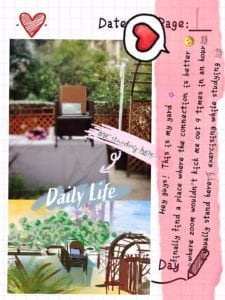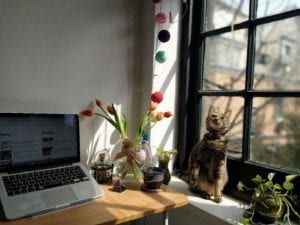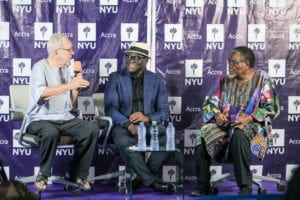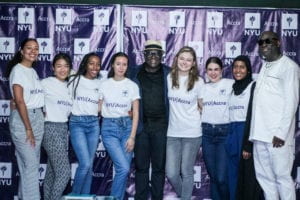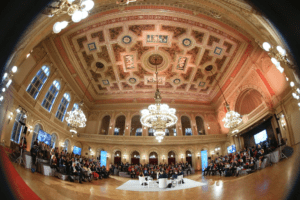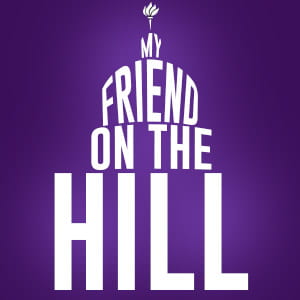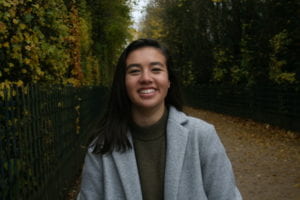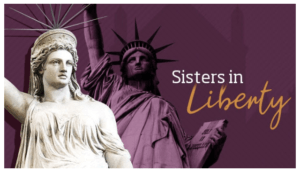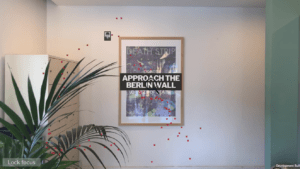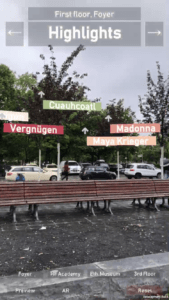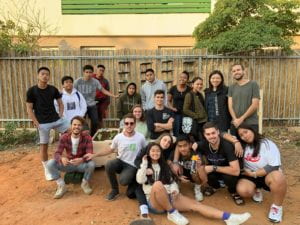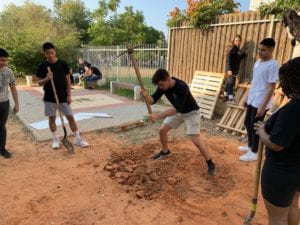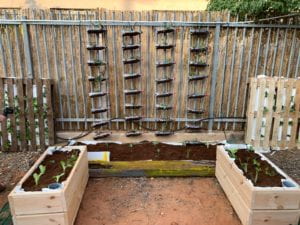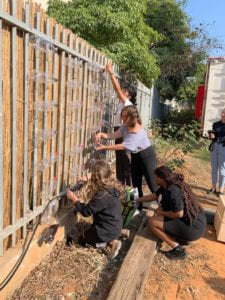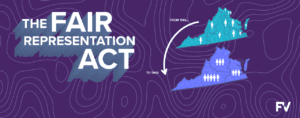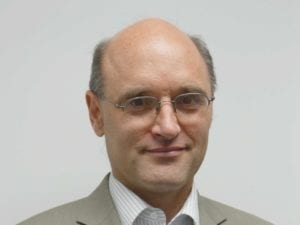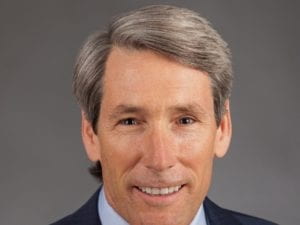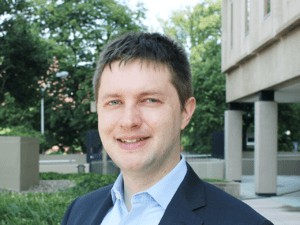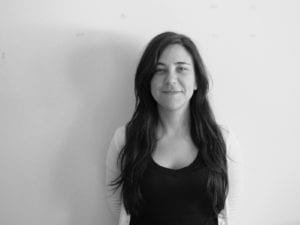 NYU Shanghai’s Century Avenue campus is quiet these days, but that doesn’t mean that university life has ground to a halt in the wake of COVID-19. Digital learning began February 17 – and many parts of university life – from athletics to tutoring to just hanging out with classmates have gone digital as well. Until students and faculty can reconvene in Shanghai later this spring, here are some of the innovative ways our community has been staying connected.
NYU Shanghai’s Century Avenue campus is quiet these days, but that doesn’t mean that university life has ground to a halt in the wake of COVID-19. Digital learning began February 17 – and many parts of university life – from athletics to tutoring to just hanging out with classmates have gone digital as well. Until students and faculty can reconvene in Shanghai later this spring, here are some of the innovative ways our community has been staying connected.
24-hour digital tutoring support in real-time
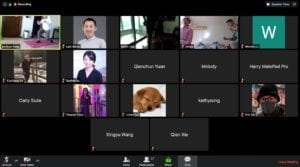 The Academic Resource Center (ARC) has been offering support 24-hours a day to the entire NYU Shanghai student population. Fourteen Global Writing & Speaking Fellows have set up their hours to cover different time zones around the world so that they can conduct real-time sessions on writing, speaking, reading and academic coaching. ARC is also hosting six online academic skills workshops to help students adapt to the distance learning model, including overcoming writer’s block, generating ideas, and how to create captivating PPTs. For support on specific courses and for individual or group tutoring sessions, students can work with Learning Assistants via Zoom and NYU Classes.
The Academic Resource Center (ARC) has been offering support 24-hours a day to the entire NYU Shanghai student population. Fourteen Global Writing & Speaking Fellows have set up their hours to cover different time zones around the world so that they can conduct real-time sessions on writing, speaking, reading and academic coaching. ARC is also hosting six online academic skills workshops to help students adapt to the distance learning model, including overcoming writer’s block, generating ideas, and how to create captivating PPTs. For support on specific courses and for individual or group tutoring sessions, students can work with Learning Assistants via Zoom and NYU Classes.
Log onto WCOnline to make appointments with either a Global Writing & Speaking Fellow or Learning Assistant. Students can also sign up for workshops on Orgsync.
The ARC’s Academic Accommodations Team will also be implementing appropriate and reasonable accommodations for students with disabilities by working with the NYU Moses Center for Students with Disabilities. Learn about student resources for academic accessibility and accommodations HERE.
Live at-home workouts for the entire community
 Anyone who has a yoga mat and a bit of floor space can join the home workout program launched by the NYU Shanghai Athletics team, hosting 12 sessions a week until we get back on campus. Professional instructors from the Athletics team have set up a series of live and pre-recorded classes such as yoga, pilates, resistance band training, and full-body workouts. So far, nearly 130 people have joined 24 sessions.
Anyone who has a yoga mat and a bit of floor space can join the home workout program launched by the NYU Shanghai Athletics team, hosting 12 sessions a week until we get back on campus. Professional instructors from the Athletics team have set up a series of live and pre-recorded classes such as yoga, pilates, resistance band training, and full-body workouts. So far, nearly 130 people have joined 24 sessions.
“It has been a good experience for everyone, students, faculty, and staff,” says Athletic Director Luis Wang. “And we do not push a high-intensity workout, so anyone can join.”
“Star Chef of NYU Shanghai” — putting culinary skills to the test
A popular phrase on Chinese social media these days goes, “everyone is becoming a professional chef while stuck at home.” In light of this trend, the NYU Shanghai Youth League is hosting a community-wide cooking contest. The Youth League is calling for community members to submit photos, videos, and recipes that express their culture, have a unique history or even come from a secret family recipe.
“Though we are temporarily separated, we hope to connect with each other across the world through cultural and personal stories behind the dishes,” says Vivian Chen, Secretary of the Youth League Committee.
Each participant will receive a Starbucks voucher, but the top three winning chefs can choose one of the following prizes: a blender, waffle iron, electric kettle, fruit tea kit.
Those who wish to participate in “Star Chef of NYU Shanghai” have until March 5 to submit a photo of their dish taken from above, and a 150-word intro about the dish and the story behind it. Contest participants can also submit an optional selfie with their dish and a short (one-minute) demonstration video. See a sample video here. Please send your entry to shanghai.youthleague@nyu.edu.
Self-expression as therapy
This week, the Health & Wellness Center kicked off its Creativity Challenge, a digital art workshop where members of the NYU Shanghai community can create and share their art on WeChat. The Health and Wellness Center issued daily prompts over the course of the week, such as “connection” and “space.” Participants created works of art based on how their home and work environments made them feel, and challenged themselves to re-examine their personal spaces with an artistic eye.
“I think art is very powerful,” says Wellness Counselor Yang Lu. “It’s very touching and beautiful to see the group start to reflect on their own childhood experience after someone shared a sketch of the terrace at their grandparent’s house. You can see connections building.”
“I am inspired by how students recognize and appreciate the positive aspects of their lives and environments during this time, such as spending more time with family members and pets,” says Carly Suita, Senior Specialist of Health Promotion and Student Well-being. “I am also impressed by students’ adaptability, resilience and imagination while they are setting up new homes and study spaces.”
The Health and Wellness team currently hosts a weekly Community Discussion Hour using Zoom. This is an open space to connect with others, share feelings and experiences, and provide support during these uncertain times. Throughout March, the team will be launching more interactive programs and educational resources through WeChat and Zoom, covering a variety of health and wellness topics.
Language practice with peers
NYU Shanghai’s Office of Student Life has kicked off a language exchange program for students to practice Chinese or English. The program is available to all NYU Shanghai students, including short-term study away students. Topics for conversation include food, entertainment, politics, and social justice.
This semester, 11 pairs of students–located everywhere from Shanghai, New York, and Washington to Abu Dhabi, Tel Aviv, and Florence–will “meet” at least once a week, and switch off from week to week between Chinese and English. Participants have been using a side range of digital tools, such as NYU Zoom, WeChat, Snapchat, and Douyin. Some student pairs even “share meals” with each other, with students in the US having dinner while students in China have breakfast.
Video auditions for the 2020 NYU Shanghai Reality Show
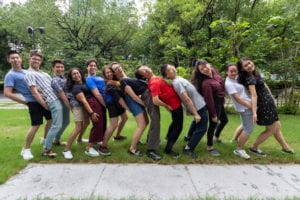 The show must go on, and so must the decade-old NYU tradition. Each year, upperclassmen from each of NYU’s three global campuses stage “The Reality Show” for incoming freshmen, and this year is no exception.
The show must go on, and so must the decade-old NYU tradition. Each year, upperclassmen from each of NYU’s three global campuses stage “The Reality Show” for incoming freshmen, and this year is no exception.
This year, NYU Shanghai students auditioned by creating 3-minute videos featuring a song and an original monologue, scene, or dance segment. Topics covered in the audition clips include stress, roommates, city life, homesickness, and of course, the impact of the COVID-19 outbreak.
A place to share stories and experiences
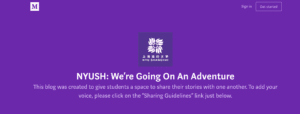 To give NYU Shanghai students a space to share their stories with one another, Dagla Rodriguez ’23, with support from Craig Protzel, director of the Low Res MA in IMA, created a blog on Medium titled NYUSH: We’re Going on An Adventure. All contributing authors must have an NYU email address to post.
To give NYU Shanghai students a space to share their stories with one another, Dagla Rodriguez ’23, with support from Craig Protzel, director of the Low Res MA in IMA, created a blog on Medium titled NYUSH: We’re Going on An Adventure. All contributing authors must have an NYU email address to post.
Rodriguez writes, “students who chose NYU Shanghai as their school are curious. We are individuals who wanted to engage with unfamiliarity, expanding our world beyond what we have always known [and…] our desire to shape and share our stories with one another has not dissipated.”
Workstations from around the world
University Communications is calling for members of the community to share photos of their workstations away from Century Avenue. We want photos of the spaces that have become your gateway to NYU Shanghai. Show us where you go to class, hold meetings, plan lessons and work to keep life at NYU Shanghai virtually vibrant. Send your submissions to nyushanghai.uc@nyu.edu.
This post comes to us from NYU Shanghai, you can find the original and read more here.

